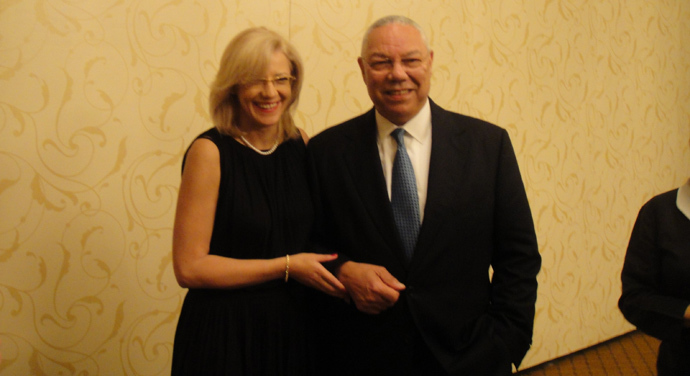Personal email exchanges posted by the notorious hacker known as “Guccifer” between Colin Powell and a Romanian member of the European Parliament has prompted the former secretary of state to publicly deny any allegations of an affair.
Four months after Guccifer first broke into the retired general’s
AOL account, the hacker took control of another retired general’s
Facebook account, and posted a message on Powell’s Facebook wall
with a link to 10 emails along with a variety of photos stored on
Google Drive.
The messages involved correspondence between Powell, 76, who
served as president George W. Bush’s secretary of state from 2001
to 2005, and Corina Cretu, 45, formerly an assistant to the
president of Romania.
Powell issued a statement to The Smoking Gun following an attempt
to contact him regarding the 2010 and 2011 email exchanges with
Cretu. According to Powell the two met while he served as
secretary of state as they both “occasionally attended the same diplomatic
and international meetings.”
Following his departure from the state department in 2005 Powell
states that the two kept in touch.
“Over time the emails became of
a very personal nature, but did not result in an affair. Those
type of emails ended a few years ago. There was no affair then
and there is not one now,” wrote Powell.
Some of the personal correspondence include references by Cretu
of Powell being the love of her life insinuates a decade-long
relationship according to The Smoking Gun.

"In light of what was happening
it seems obvious to ask Ms Cretu to delete emails," Powell
wrote to TSG.
"She sent photos on a regular
basis. Lots of family photos with her nieces, who she adores,
family reunions, formal business sessions, her wedding and some
bathing suit photos ... Never anything improper," he
added. According to Powell he and Cretu have only seen each other
“once or twice” over the
past eight years.
Guccifer has previously targeted other high profile public
officials. Within the last eight months the hacker has managed to
break into the online accounts of former Clinton and Bush
administration officials, as well as former FBI agents, defense
contractors, Bush family members and other notable figures
including journalist Carl Bernstein and author Candace Bushnell.
In June, Guccifer compromised the Facebook account and possibly a
personal email account belonging to Neile Miller, an Obama
administration official and former acting administrator of the
National Nuclear Security Administration (NNSA), the agency
responsible for maintaining America’s nuclear stockpile and
tracking down “loose
nukes” worldwide.
In May, the hacker breached the personal email accounts of
Christopher Kojm, who heads the National Intelligence Council,
along with Joshua Gotbaum, director of the Pension Benefit
Guaranty Corporation.
In a lengthy note sent to TSG accompanying screen grabs of Kojm’s
email account Guccifer referred to Obama as “The Black Angel,” and taunted the
US secret service which has been on the hunt to capture the
elusive hacker. That note concluded “Good night America where ever you
are."
Guccifer has reached out to a variety of outlets with information
extracted from these public officials in the past. In March, RT
received multiple emails the hacker had obtained from Sidney
Blumenthal, a 64-year-old journalist who formerly worked as an
assistant to then-president Bill Clinton. The memos pertained to
sensitive information that had been sent to former US secretary
of state Hillary Clinton in the wake of last year’s terrorist
attack in Benghazi, Libya.
Only several days later RT and other outlets received a second batch of sensitive documents from
Blumenthal’s compromised email account, this time with
correspondence to Clinton detailing a January 2013 Algerian
hostage crisis in which three Americans died, as well as
information on the inner workings of now-deposed Egyptian
president Mohamed Morsi’s administration.
In all instances Guccifer seems to have gone to great lengths to
cover his tracks and prevent federal investigators from catching
up with him. His previous tactics have included using compromised
email accounts to disseminate leaked information to the media, as
well as other standard tools of the trade, including proxies and
IP spoofing.

